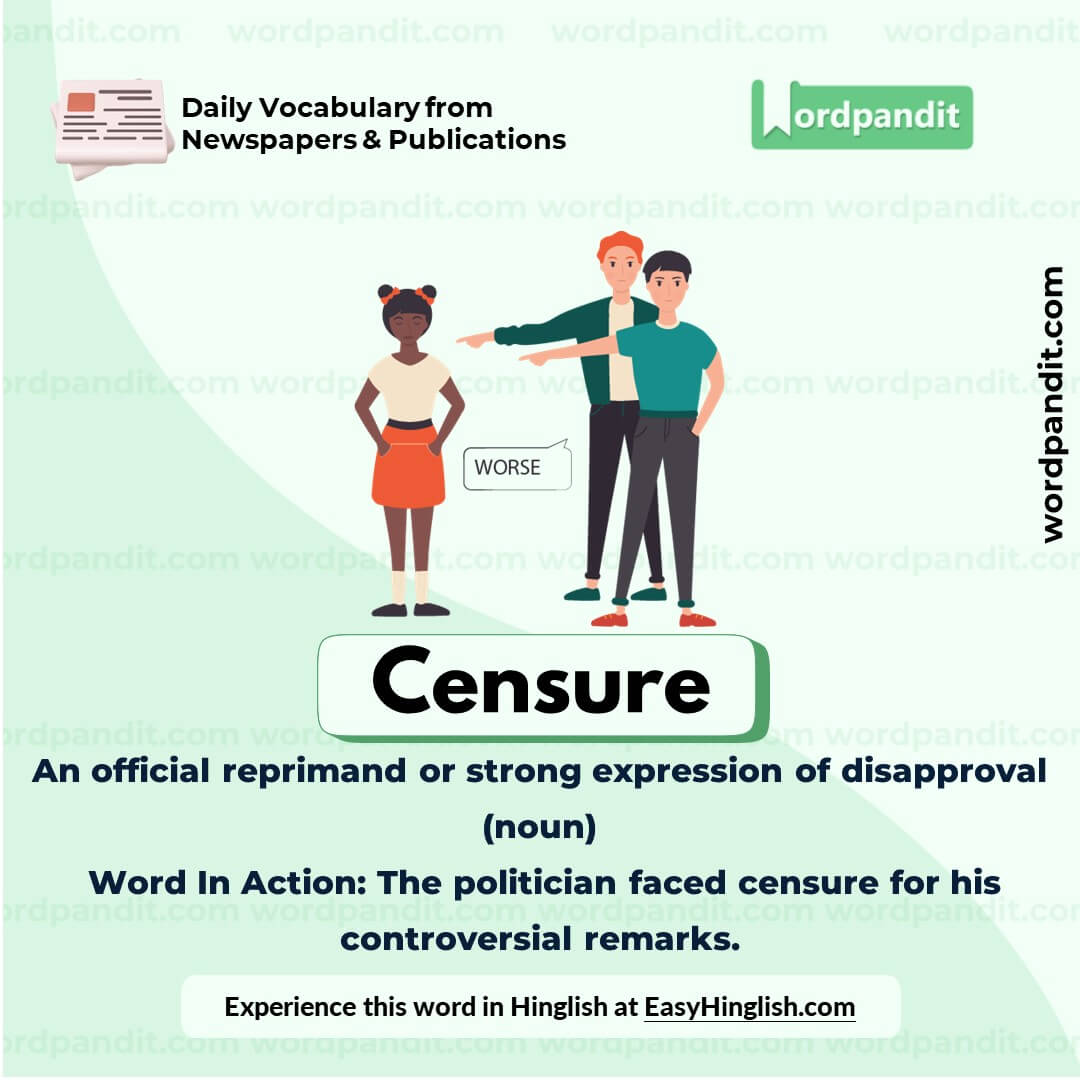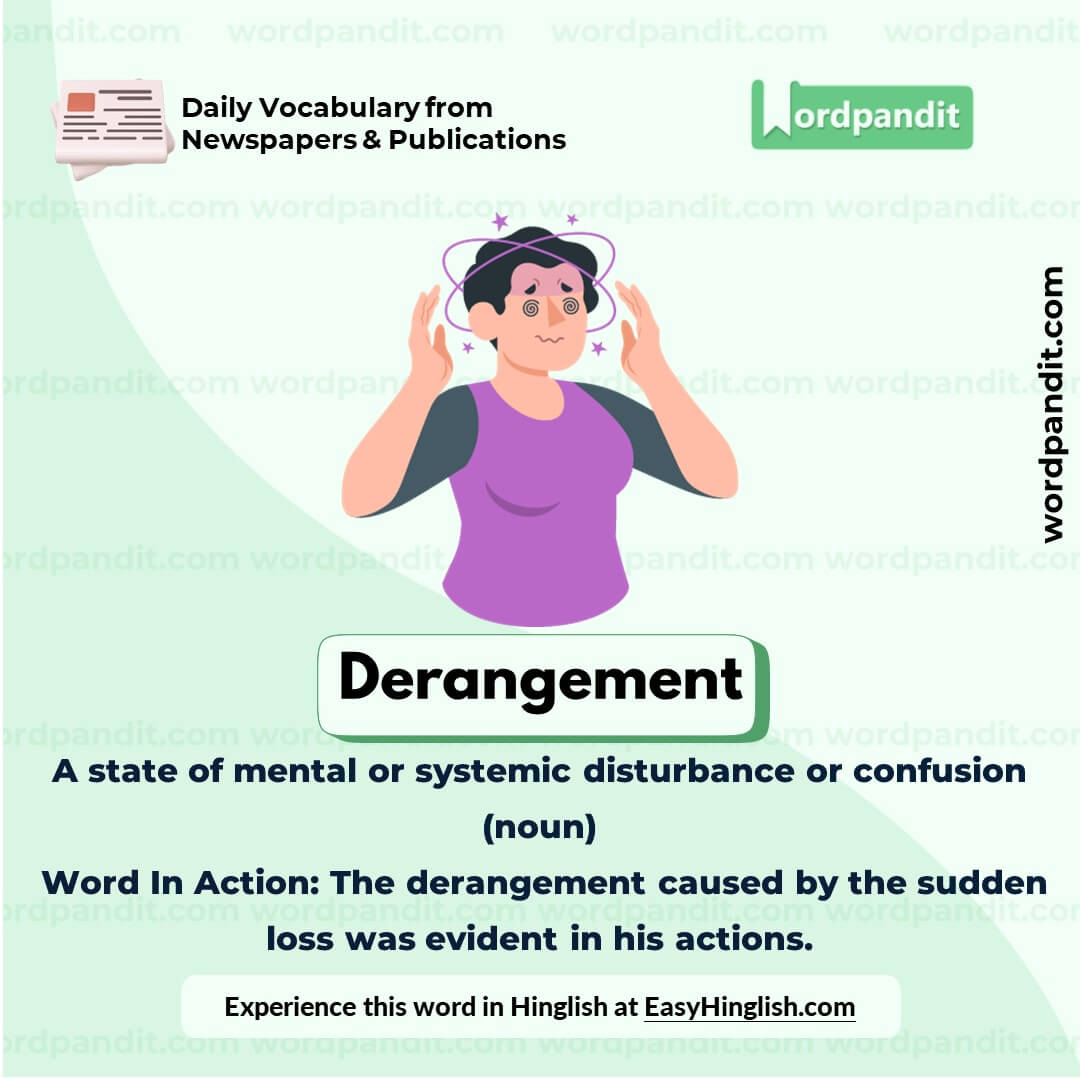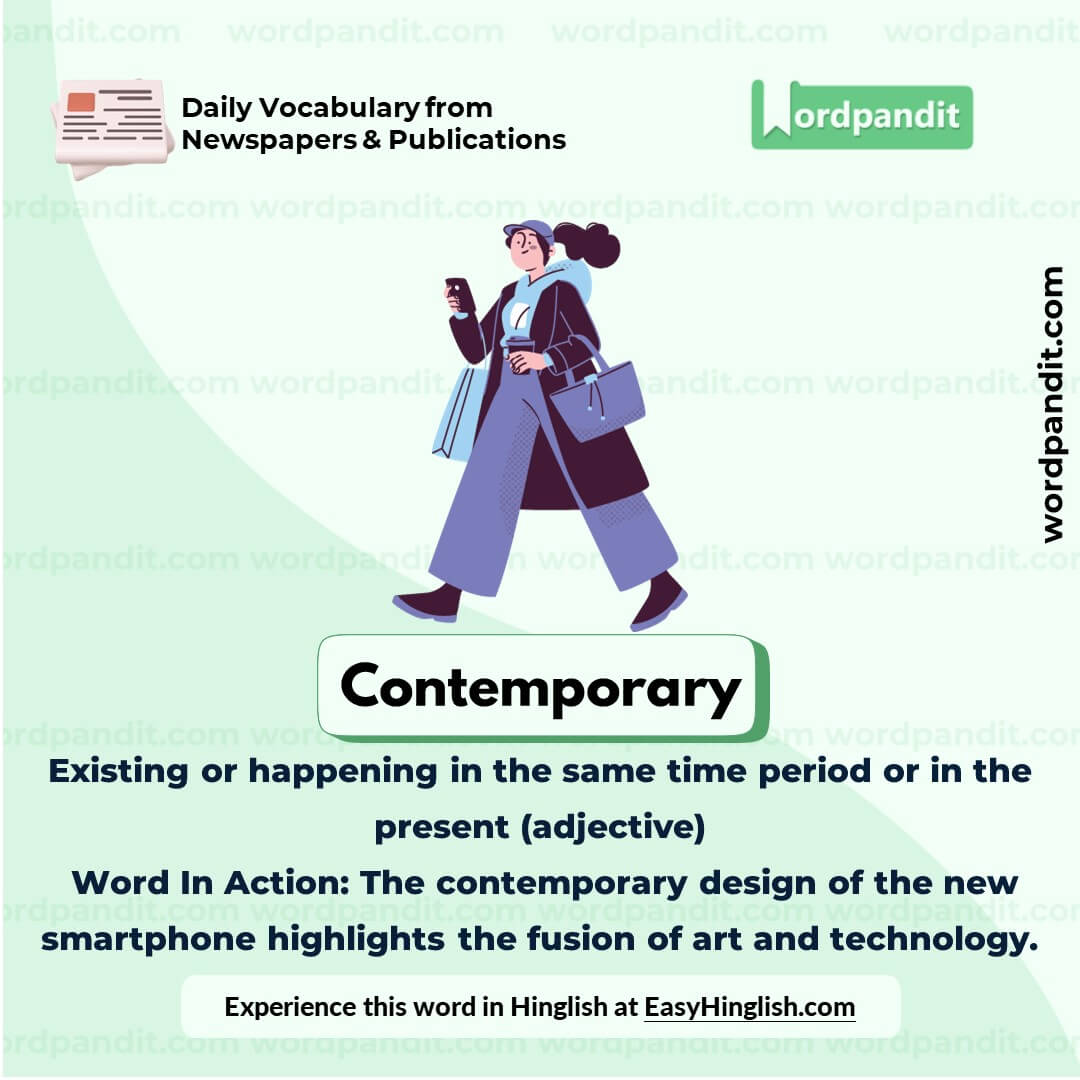Daily Vocabulary from International Newspapers and Publications
Expand Your Vocabulary with Wordpandit’s Global Vocabulary Hub
At Wordpandit, we are committed to helping you develop a truly global vocabulary by drawing from some of the most respected international publications. This section is designed to keep you ahead of the curve by introducing you to words that define global conversations and trends.
The Power of Global Sources
To help you think and communicate on a global scale, we curate vocabulary from renowned international sources, such as:
- The New York Times
- The Washington Post
- BBC
- The Guardian
- The Economist
- Scientific American
- Psychology Today
- And many more...
Stay Global, Stay Competitive
Our daily updates from international publications ensure you are consistently exposed to new words that reflect global news and developments, making sure your vocabulary is not only current but also globally relevant.
Enhance Your Global Perspective
Whether you’re preparing for international exams, aiming to excel in global business communication, or want to enhance your language skills for personal growth, Wordpandit offers the resources you need to thrive in a global context.
Effective Learning, Global Reach
Our learning methodology combines global examples, memory aids, and interactive activities, allowing you to internalize new words effectively and apply them in real-world scenarios.
Begin Your Global Vocabulary Journey Now!
Why Choose Wordpandit?
Practical Learning: Focus on words you'll actually encounter in real-world reading, enhancing your comprehension and communication skills.
Diverse Content: From current affairs to scientific breakthroughs, our varied sources expose you to vocabulary across multiple domains.
Effortless Integration: Make Wordpandit a part of your daily routine. Just a few minutes each day can significantly boost your lexicon over time.
Your Path to Vocabulary Mastery
- Visit our Daily Vocabulary section regularly
- Explore new words and their usage in context
- Practice incorporating these words into your own writing and speech
- Track your progress as your vocabulary expands
Start Your Journey Today
Embark on your vocabulary enhancement journey with Wordpandit. By consistently engaging with our daily posts, you'll build a robust vocabulary that serves you well in academic, professional, and personal contexts.
Remember, a word a day keeps linguistic limitations at bay. Make Wordpandit your daily companion in the quest for vocabulary excellence!
WORD-1: Censure
Context:
"The toxic air pollution and recurrent winter smog in Indian capital Delhi and other parts of northern India frequently makes headlines, becoming a matter of public concern, political debate and legal censure." - BBC
Explanatory Paragraph:
The word "censure" refers to the act of expressing severe disapproval of someone or something, especially in a formal setting like a government or legal body. It highlights a strong, often official, rebuke aimed at addressing unacceptable behavior or actions.
Meaning: An official reprimand or strong expression of disapproval (noun).
Pronunciation: SEN-sher
Difficulty Level: ⭐⭐⭐ Intermediate
Etymology: Derived from Latin "censura," meaning "judgment" or "opinion," and later adopted into Middle English to signify condemnation.
Synonyms & Antonyms:
Synonyms: Condemnation, reprimand, reproach, rebuke, disapproval
Antonyms: Praise, commendation, approval, endorsement
Usage Examples:
- The senator faced public censure for his unethical conduct.
- The company’s environmental policies attracted censure from activists worldwide.
- The teacher censured the student for his disruptive behavior during class.
- Failure to comply with the new regulations might result in censure by the regulatory authority.
Cultural Reference:
"Censure is not a form of persecution; it is a necessary response to failure and wrongdoing in governance." - Paraphrased from political discussions on accountability.
Think About It:
What distinguishes censure as a formal response from informal criticism or personal disapproval?
Quick Activity:
Write a short paragraph describing a situation where a public figure faced censure. Reflect on whether it was justified.
Memory Tip:
Think of "censure" as "sending sure disapproval" – an authoritative way to express strong disagreement.
Real-World Application:
Censure is frequently used in politics and governance, such as when legislative bodies pass resolutions to formally reprimand officials for misconduct.
WORD-2: Derangement
Context:
"In his 2016 book, The Great Derangement, author Amitav Ghosh, who has written extensively about climate change, observed that such stories were missing from contemporary fiction." - BBC
Explanatory Paragraph:
The term "derangement" refers to a state of disturbance or disorder, often related to mental instability, chaos, or a deviation from normal functioning. It can describe a breakdown in mental health, social systems, or natural processes.
Meaning: A state of mental or systemic disturbance or confusion (noun).
Pronunciation: dih-RAYNJ-ment
Difficulty Level: ⭐⭐⭐ Intermediate
Etymology: From the French word "déranger," meaning "to disturb," which in turn stems from Old French "desrengier" (disarrange).
Synonyms & Antonyms:
Synonyms: Disorder, disarray, chaos, insanity, disruption
Antonyms: Order, stability, clarity, sanity, organization
Usage Examples:
- The derangement of the natural climate cycle is evident in the increasing frequency of extreme weather events.
- The patient's derangement was treated with careful therapy and medication.
- Political derangement often results in the collapse of governance and stability.
- His irrational outburst was dismissed as a momentary derangement caused by stress.
Cultural Reference:
"The Great Derangement" by Amitav Ghosh highlights how modern literature has often failed to grapple with the profound disruptions caused by climate change, representing a societal blind spot.
Think About It:
How does the concept of "derangement" apply to current global challenges, such as climate change or technological disruption?
Quick Activity:
Think of an event in history where a system or society experienced derangement. Write a brief description of what caused it and how it was resolved.
Memory Tip:
Imagine the word "derangement" as "de-arrangement" — the opposite of things being orderly and arranged.
Real-World Application:
The term "derangement" is often used in discussions of mental health, environmental crises, or systemic breakdowns, helping to illustrate the gravity of disruption in various contexts.
WORD-3: Contemporary
Context:
"In his 2016 book, The Great Derangement, author Amitav Ghosh, who has written extensively about climate change, observed that such stories were missing from contemporary fiction." - BBC
Explanatory Paragraph:
The word "contemporary" refers to something belonging to the same time period as something else or something modern and current. It is often used to describe people, art, ideas, or events that are relevant to the present or to a specific historical period.
Meaning: Existing or happening in the same time period or in the present (adjective).
Pronunciation: kuhn-TEM-puh-rair-ee
Difficulty Level: ⭐⭐⭐ Intermediate
Etymology: From Latin "contemporarius," combining "con-" (together) and "temporarius" (of time), meaning "of the same time."
Synonyms & Antonyms:
Synonyms: Modern, current, present-day, up-to-date
Antonyms: Old-fashioned, outdated, antiquated, archaic
Usage Examples:
- The museum features an impressive collection of contemporary art.
- Shakespeare and Cervantes were contemporaries, writing during the same era.
- The novel captures the struggles of contemporary life in a bustling metropolis.
- Her ideas are rooted in contemporary research and progressive thought.
Cultural Reference:
Contemporary art movements, such as abstract expressionism or pop art, reflect the ideas and sensibilities of the modern era, emphasizing innovation and breaking with tradition.
Think About It:
What defines something as "contemporary," and how might this definition vary across different fields such as literature, art, or technology?
Quick Activity:
List three examples of contemporary trends in art, technology, or culture that you find fascinating.
Memory Tip:
Link "contemporary" with "temporary" to recall its connection to time—things that are relevant to the present time.
Real-World Application:
The term "contemporary" is widely used in describing art, fashion, literature, and societal trends that are part of or influenced by the current era.
WORD-4: Converse
Context:
"They are also being built into chatbots powered by large language models so they can hold, respond and converse in a far more natural and convincing way." - BBC
Explanatory Paragraph:
The word "converse" refers to the act of engaging in spoken communication or dialogue with someone. It emphasizes an exchange of ideas or information, typically in a conversational and interactive manner. In broader contexts, "converse" can also mean the opposite of something, but in this case, it specifically refers to communication.
Meaning: To talk or engage in dialogue (verb); something that is opposite or reverse (noun).
Pronunciation: kuhn-VURS (verb), KON-vurs (noun)
Difficulty Level: ⭐⭐ Beginner
Etymology: Derived from Latin "conversari," meaning "to live or dwell with," later adapted into Middle English to mean "to talk."
Synonyms & Antonyms:
Synonyms: Chat, talk, discuss, communicate, dialogue
Antonyms: Ignore, silence, quiet, monologue
Usage Examples:
- The teacher encouraged students to freely converse with one another during the group activity.
- She enjoys conversing with people from diverse backgrounds to gain new perspectives.
- In online games, players often converse using voice chat for better coordination.
- The chatbot was designed to converse naturally with users, mimicking human speech patterns.
Cultural Reference:
The ability to converse fluently is a defining characteristic of advanced AI-powered tools like chatbots, which aim to bridge the gap between human and machine interaction.
Think About It:
How has the ability to converse with machines, such as chatbots, changed the way we interact with technology?
Quick Activity:
Write a short dialogue between two people discussing their favorite books, using the word "converse" naturally in the text.
Memory Tip:
Remember "converse" as "con-vers(e)"—think of "con" (together) and "verse" (a line of words) to recall its meaning of exchanging words.
Real-World Application:
Converse is commonly used in everyday language when referring to friendly or professional discussions. It is also a critical skill for AI technologies aiming to replicate human communication.
WORD-5: Cloning
Context:
"Artificial intelligence-powered speech synthesisers can now hold eerily realistic spoken conversations, putting on accents, whispering and even cloning the voices of others." - BBC
Explanatory Paragraph:
The word "cloning" refers to the process of creating an identical copy of an organism, object, or system. In biology, it means replicating genetic material to produce exact duplicates, while in technology, it can refer to duplicating digital or physical properties, such as a person’s voice or appearance.
Meaning: The act of making an exact copy of something, especially in biology or technology (noun).
Pronunciation: KLOH-ning
Difficulty Level: ⭐⭐ Beginner
Etymology: Derived from the Greek word "klon," meaning "twig" or "branch," which was adopted in modern science to refer to genetic replication.
Synonyms & Antonyms:
Synonyms: Copying, duplication, replication, reproduction
Antonyms: Originality, uniqueness, singularity, divergence
Usage Examples:
- Scientists succeeded in cloning a sheep, which they named Dolly, marking a milestone in genetic research.
- AI software allows for cloning voices, creating realistic imitations of famous individuals.
- The company specializes in cloning hard drives to ensure data security and backup.
- Ethical concerns about cloning often center on its implications for identity and individuality.
Cultural Reference:
Cloning entered popular imagination with the creation of Dolly the sheep in 1996, the first mammal cloned from an adult cell, igniting global debates on the future of genetic science.
Think About It:
What ethical considerations should be prioritized when deciding how cloning technologies are used?
Quick Activity:
Research a real-world application of cloning, such as in agriculture or medicine, and write a paragraph explaining its significance.
Memory Tip:
Think of "cloning" as "cloning a clone" — a repetitive process of making identical copies.
Real-World Application:
Cloning is widely used in agriculture for producing high-yield crops, in medicine for creating genetic models, and in technology for replicating digital assets, such as voice or data backups.

















